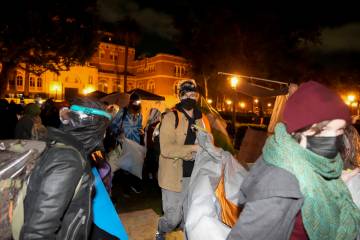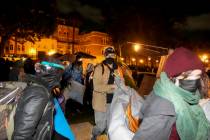Valley teens competing with older people for summer work
Las Vegan Lindsey Riley says she's never seen a job market this bad.
OK, so Riley's only 17. But even with her limited experience, she's onto something: Experts say teens looking for summer work haven't had it this bad since the end of World War II, as their parents and grandparents, laid off and stripped of savings, push youngsters into the unemployment lines.
"People my age are competing with people of an older age, and people with more experience," said Riley, who plans to attend the University of Nevada, Reno in the fall to study biology. "Since I've worked only three jobs, it's so much harder for me to be qualified than it is for a person who's 40 or 50 years old who's been working all their life."
Riley launched her job search in December. She applied for 20 or 25 positions, mostly inside local restaurants, and received nary a callback before this week. It's a big change from the summers of 2007 and 2008, when she said it was easy for her to find work selling frozen custard and handling clerical work for a doctor.
Millions of teens nationwide have hit the same wall Riley ran into, and the obstacles they face in 2009 will have broad implications for work force preparedness and earning power for years to come, experts say.
Roughly 30 percent of America's 17 million teens will work this summer, according to new numbers from the Center for Labor Market Studies at Northeastern University in Boston. That's the lowest youth employment rate since the mid-1940s, when legions of soldiers returned home from war and flooded the job market, said Andrew Sum, an economics professor and director of the Center for Labor Market Studies.
While just under 6 million kids will hold summer jobs in 2009, another 3 million kids want to work but won't find employment. In the summer of 1980, 58 percent of teens worked. The share was about 45 percent in 2000. If teens today worked at the same rate year-round as their peers did nine years ago, another 2.6 million kids would have jobs.
"The job market for teens is horrendous," Sum said. "There's a very large number of kids who want to work, and we just don't have anything for them."
Twin factors have eroded teens' job prospects. There are fewer jobs, as recession-wracked companies slash positions, and there's more competition for that scarcer work, as unemployment has surged to 8.9 percent nationally and 10.4 percent locally.
Numbers from work-search Web site SnagAJob.com show 54 percent of hiring managers nationwide plan to recruit summertime employees in 2009. That tracks roughly even with 2008's results. What's different is that nearly half of those hiring said they'd create up to 50 percent fewer jobs in 2009 than they added in 2008, said Cathy McCarthy, senior vice president of marketing for the Virginia-based company.
SnagAJob.com also found that more people will fight for that smaller jobs base.
Nearly three quarters -- 73 percent -- of employers the company surveyed said they expect more applications this summer from people seeking seasonal work. At SnagAJob, the number of applications per position has spiked about 50 percent compared with 2008 figures.
Those applications aren't coming just from teenagers.
Senior citizens with depleted 401(k)s, recent college graduates who can't find white-collar jobs in their majors and middle-aged workers handed pink slips have besieged service industries with résumés. Even companies in traditionally youth-centric sectors, such as theme parks and restaurants, have seen big gains in adult queries.
"The number of applicants who are adults is so overwhelming that a lot of places tell kids, 'Don't even bother to apply,'" Sum said.
Older workers bump kids to the bottom of the ladder for a variety of reasons, McCarthy said.
First, employers prefer job candidates with work experience and references, because proven employment history means less of a hiring risk. Second, kids under 18 fall under more restrictive labor laws that limit the hours they can work or the machinery they can operate. Finally, employers frequently tell Sum that today's kids lack "soft skills" -- basic workplace etiquette such as calling in if you're running late or asking for time off before taking it. Supervisors would rather hire adults who understand office protocols.
The reluctance to give kids a chance will affect their prospects for years to come, Sum said. People learn those soft skills mostly through work experience. Plus, people who work when they're 16 and 17 will work more, and earn more, when they're in their late teens, 20s and beyond. Less work today means less experience tomorrow, which translates into lower pay later, for even less incentive to work harder in the long run.
"We're setting up really big gaps in the future for these kids to be working and earning," Sum said.
Still, plenty of teenagers will land summer jobs in 2009.
"We don't want teens to give up. We see people hired every week," McCarthy said.
McDonald's, thrift-store chain Savers and discount retailer Kmart all have local openings listed through SnagAJob.com.
Riley has come up with a different strategy. After six months of searching, she finally landed an offer Tuesday for a hostess position at New York-New York, but the hours don't suit her. Instead, she's going to volunteer at a local hospital, which better matches the medical career she sees in her future.
"For me, working is not about the money. I have fun at jobs and I've always liked working," she said. "It's mostly about having something to do and doing it well."
Contact reporter Jennifer Robison at jrobison@reviewjournal.com or 702-380-4512.




























